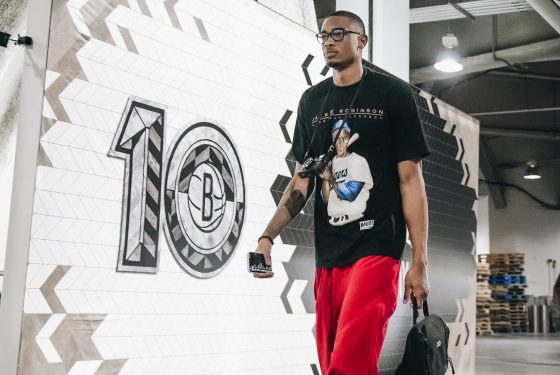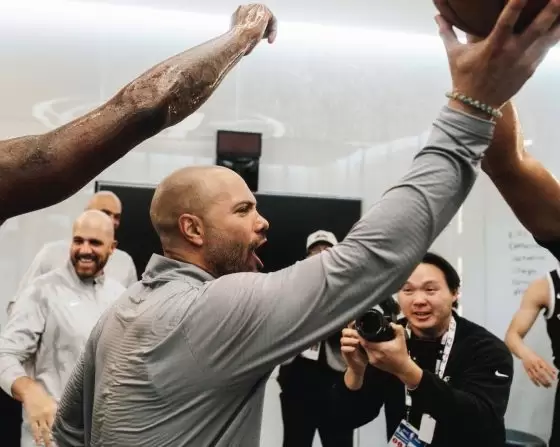Over the past week, we’ve all heard how the Boston Celtics stepped away from the negotiating table once the Brooklyn Nets countered Brad Stevens’ original offer for Kevin Durant. And at some point or other, we’ve all tried to figure out who the ‘additional role player’ could be, should Stevens re-enter into discussions in the coming weeks.
Rest assured, there’s little-to-no chance that the additional guy will be Robert Williams, as giving up Jaylen Brown, Marcus Smart, and the Time Lord is the quickest route to NBA purgatory — regardless of who’s coming back in return.
That’s where Grant Williams’ name comes into the equation, as his improvements over the last twelve months make him a desirable addition to a trade package. However, there is a slight snag in that equation, one which might work in Williams’ favor, assuming he wishes to remain with the Celtics.
Grant Williams is entering the final year of his rookie scale contract, and is eligible for an extension. Before his improved play last season, Boston could have paid him pennies on the dollar and kept the young forward around long-term. Things are different now, though. This means the Celtics have a potential headache on their hands — a headache no other team would want to acquire before the start of the season.
Photo by Adam Glanzman/Getty Images
Rather than expecting to pay Williams a nominal fee over the next few years, he has played himself into a reasonable contract, one that could range between $8 million and $12 million a year without anyone batting an eye. Brad Stevens will surely have a number in mind, and won’t want to exceed that, if at all possible.
But Williams holds some of the cards here. The Tennessee alum has the ability to reject an extension and test free agency if he feels like he could earn more in the open market, at which point, Boston would need to go deeper into their checkbook.
Why on Earth would Brooklyn, or any other potential trade partner want to absorb that kind of headache? Sure, Williams has proven himself in the post-season and was a key factor in how the Celtics defended (ahem) Kevin Durant, Giannis Antetokounmpo, and Bam Adebayo in the playoffs, but at the end of the day, you’re essentially paying him based on a one-year sample size.
I’ve said this a bunch through the week, but Grant Williams being trusted to switch onto Kyrie and KD on the perimeter – and limiting those guys – speak volumes to his development since last season
— Adam Taylor (@AdamTaylorNBA) April 24, 2022
Because, before last season, you weren’t getting this type of production from the third-year combo big, and there were legitimate concerns about his ability to remain in the league beyond his rookie contract.
“I would say it’s 70/30 – Improvement side is 70, I feel like the amount of effort I put into making shots last summer, and the defensive intensity I’ve grown with…that allowed me to fulfill a role that was needed. And the opportunity arose,” Williams said while appearing on a recent episode of Duncan Robinson’s podcast.
Suddenly, despite his impressive season, Williams looks like somebody you want no part of, at least, not until his contract situation is resolved.
The flip side of the argument
Now, that’s not to say Boston wouldn’t be willing to include him in a trade, because the same reason other teams are likely turning their nose up at him, is the same reason the Celtics could be tempted into negotiations — you pass the problem onto somebody else.
The last thing you want, as a contending team, is to have a disgruntled player in the locker room, who feels some type of way because negotiations have stalled, or they weren’t happy with what was on offer. Furthermore, Boston is already on damage control, as Jaylen Brown can’t be happy about being floated in trade rumors for the umpteenth time.
So, if Brooklyn or any other potential trade partner was to show interest in Williams this summer, there’s a very real chance the front office could be tempted to wash their hands of a scenario that could quickly become problematic for them.
Restricted Free Agency
It’s worth noting that should Williams and the Celtics, or any other team, fail to agree to an extension, that doesn’t mean he can simply walk away in the summer. Under that premise, Williams would enter restricted free agency, allowing Boston to match any offer that came in for the versatile forward – but that can sometimes be detrimental to a team’s cap flexibility.
The Phoenix Suns took this route with Deandre Ayton last season and ended up matching a $133 million offer from the Indiana Pacers. Obviously, Williams won’t fetch that type of money on the free agent market — but teams will look to drive the price up, even if it’s just to hamstring the Celtics moving forward.
While the notion of entering a bidding war next summer isn’t likely to add much urgency to Stevens’ sitting at the negotiating table, it is certainly an additional reason to believe all parties involved will want to reach an amicable agreement as early as possible.
The reality
Assuming Williams is malleable on contractual terms, this issue doesn’t become a factor, and he remains in Boston for the foreseeable future. The fact of the matter is, if the young forward can replicate and sustain the level of production we saw from him last season, he will be a vital part of what Ime Udoka and the Celtics are trying to do from a schematic standpoint, while also being one of the best catch-and-shoot threats on the roster, if not in the league.
Williams has earned the right to discuss a big payday, but that doesn’t mean the impending discussions won’t lead to a headache, but if we’re being honest, we all knew this situation was on the horizon, and now it will be interesting to see how it all plays out.






